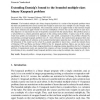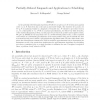127
click to vote
MP
2002
15 years 1 months ago
2002
The bounded multiple-class binary knapsack problem is a variant of the knapsack problem where the items are partitioned into classes and the item weights in each class are a multip...
114
click to vote
EOR
2007
15 years 2 months ago
2007
The knapsack problem (KP) is generalized to the case where items are partially ordered through a set of precedence relations. As in ordinary KPs, each item is associated with proï...
110
click to vote
DAM
2007
15 years 2 months ago
2007
In the partially-ordered knapsack problem (POK) we are given a set N of items and a partial order ≺P on N. Each item has a size and an associated weight. The objective is to pac...
108
click to vote
EOR
2006
15 years 2 months ago
2006
We are concerned with a variation of the knapsack problem as well as of the knapsack sharing problem, where we are given a set of n items and a knapsack of a fixed capacity. As us...
COR
2006
15 years 2 months ago
2006
This paper presents a heuristic to solve the Multidimensional Multiple-choice Knapsack Problem (MMKP), a variant of the classical 0
119
click to vote
PDPTA
1996
15 years 3 months ago
1996
This paper describes a parallelization of the sequential dynamic programming method for solving a 2D knapsack problem where multiples of n rectangular objects are optimally packed...
120
click to vote
WSC
1998
15 years 3 months ago
1998
In this paper, we present an approach for measuring certain properties of synthetic optimization problems based on the assumed distribution of coefficient values. We show how to e...
SSWMC
2004
15 years 3 months ago
2004
We analyze the complexity of the steganography problem and show that the decision version of the problem is NP-complete through transformation from the Knapsack problem. We also g...
103
click to vote
SODA
2004
ACM
15 years 3 months ago
2004
ACM
We study the average-case performance of algorithms for the binary knapsack problem. Our focus lies on the analysis of so-called core algorithms, the predominant algorithmic conce...
107
click to vote
AAAI
2004
15 years 3 months ago
2004
Knapsack constraints are a key modeling structure in discrete optimization and form the core of many real-life problem formulations. Only recently, a cost-based filtering algorith...


